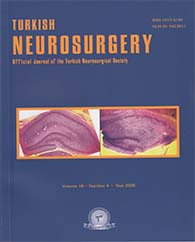3Ministry of Health, Ağrı Government Hospital, Neurosurgery Clinic, Ağrı, Turkey
6Eskişehir Osmangazi University School of Medicine, Department of Biostatistics, Eskisehir, Turkey
7Eskişehir Osmangazi University School of Medicine, Department of Pathology, Eskisehir, Turkey AIM: In this report, we aim to determine the prognostic factors influencing the length of survival in patients with low-grade gliomas.
MATERIAL and METHODS: In a retrospective evaluation, we have reviewed fiftythree patients who had been operated between the years of 1980 and 2006. The diagnoses of the patients were histopathologically verified as low-grade glioma(LGG). The medical records of the patients were reviewed for age, gender, tumor locations, extent of resection, and presence of seizure, the neurological status as defined by the Karnofsky Performance Scale (KPS) and radiotherapy treatment after surgery as possible prognostic factors.
RESULTS: Median cumulative survival time for all the patients with LGG was 141+/-14.83 months. Median survival time was 216+/-78.52 months for astrocytoma Grade I; 115+/-8.22 months for astrocytoma Grade II, and 242+/-76.36 months for oligodendroglioma. Young age, histology subtype (oligodendroglioma) and preoperative KPS were determined to have positive influence on survival according to Log Rank Test. In contrast, age, histology type and the extent of resection remained independent prognostic factors upon survival when Cox Regression Backward Stepwise (Wald) method was performed.
CONCLUSION: It can be concluded that surgery seems to be an appropriate first step option in the treatment of LGG.
Keywords : Low grade glioma, Prognostic factors, Survival




